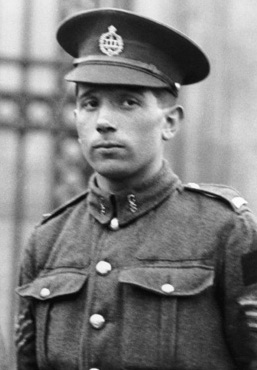
Colin Fraser Barron. [Wikimedia]
At just 24 years old, Colin Fraser Barron was awarded the Victoria Cross, along with many other honours, for his quick thinking during the Battle of Passchendaele on Nov. 6, 1917. One of the few Canadian VC recipients to also attend Queen Elizabeth II’s coronation, Barron’s actions were integral to the 1st Canadian Division advance to Ypres, Belgium, during the First World War.
“It’s a little-known story of one of the north-east’s decorated soldiers,” an AberdeenLive article noted, “one of bravery and battling spirit on the frontline.”

Wounded men during the battle of Menin Road 1917. [Wikimedia]
Barron flanked the pillbox, planning to get as close as possible.
Born in late September 1893 in Baldavie Cottage of Boyndie, Banffshire, Scotland, Barron started from humble beginnings. His mother was a cleaner and his father was a soldier, and the two never married. Wanting to experience more than just Scottish life, Barron immigrated to Canada in March 1910, joining the ranks of Toronto’s railway workers.
A few years later, though, Barron decided to follow in his father’s footsteps by becoming a soldier. He originally enlisted with the militia in May 1913, then volunteered for the Canadian Expeditionary Force in April 1915, and was eventually posted to 3rd Battalion (Toronto Regiment).
Working up the ranks, he was promoted to lance-corporal on April 8, 1917, a day before the Battle of Vimy Ridge. Barron, however, would have his own chance to make history from what has been called one of the bloodiest and most controversial battles of the First World War—the Battle of Passchendaele.
Barron’s unit was given the task of taking one of the largest German pillboxes in the sector, known as Vine Cottage. Blocking their advance, the position boasted three machine guns, half-metre-thick concrete walls and an almost 360-degree range of fire. His lieutenant, H.T. Lord, made attempts to close in on Vine Cottage, but was driven back MG-fire and torrential rainfall.
Rather than stand still in the mud, Barron snagged a Lewis light machine gun and flanked the pillbox, planning to get as close as possible. At point-blank range, Barron captured two of the three enemy guns and, with the help of some of his comrades, took a number of prisoners. Barron concluded the attack by turning the third guns on the retreating Germans, inflicting severe casualties.
With the military in his blood, Barron re-enlisted as a reserve in the 48th Regiment (Highlanders) in 1921 and continued to serve.
His actions earned him the VC, his citation stating: “The remarkable dash and determination displayed by this N.C.O. in rushing the guns produced far-reaching results.” With the military in his blood, Barron re-enlisted as a reserve in the 48th Regiment (Highlanders) in 1921 and continued to serve, including with The Royal Regiment of Canada during the Second World War.
Retiring as a lieutenant, Barron spent the remainder of his working life on the Canadian Corps of Commissionaires, working jobs at the CBC and Toronto’s Don Jail and Sunnybrook Hospital—not far from the city street that was named in his honour.
Barron died on Aug. 15, 1958, age 64.
Advertisement





















